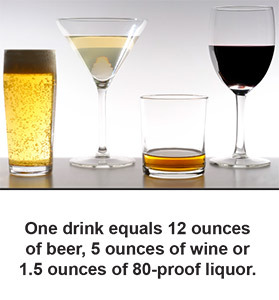Before your surgery, it is very important to be honest with your healthcare team about how much alcohol you drink. Being dishonest can affect your surgery and recovery. We want to make sure you get the best care possible and will do everything we can to help you.

Excessive alcohol use is defined as having more than three drinks per day. Binge drinking is having large amounts of alcohol less often, such as on weekends. Both of these can impact the results of your surgery and how well you recover.
How can alcohol use affect my surgery?
If you usually have more than three drinks a day, you could have a complication after surgery called alcohol withdrawal. Alcohol withdrawal happens when you suddenly stop drinking after using alcohol for a long period of time. During withdrawal, your central nervous system overreacts and causes symptoms like shakiness, sweating, hallucinations and other more serious problems.
If you have alcohol withdrawal and do not get treatment, you can have tremors, seizures, hallucinations, delirium tremens and possibly die. You will also most likely need to stay in the hospital longer, including a longer stay in the intensive care unit (ICU). Chronic heavy drinking can also affect your body’s organs and biochemical controls in the body, causing serious and life-threatening complications.
How can alcohol withdrawal treatment before surgery help me?
Getting alcohol withdrawal treatment before surgery can help you:
- Have fewer seizures and delirium tremens after surgery.
- Avoid the use of restraining devices.
- Reduce your risk of falling after surgery.
- Reduce your need for sedation medication.
- Have a shorter hospital stay than you would without treatment.
- Reduce the amount of time you need a ventilator to breathe after surgery.
- Avoid organ failure and biochemical complications caused by heavy drinking.
How do I know if I am at risk for alcohol withdrawal after surgery?
Talk to your primary healthcare provider, cardiologist or an experienced chemical dependency nurse by calling 216.363 2120.
During your presurgical visit, you will answer some questions to help us understand your risk of alcohol withdrawal and other alcohol-related problems after surgery. Please answer the questions as honestly as possible.
All information you share is held in strict confidence. We are here to help you prepare and recover from your surgery as quickly and safely as possible.
If you have questions or concerns about your alcohol use, please talk to a member of your healthcare team.